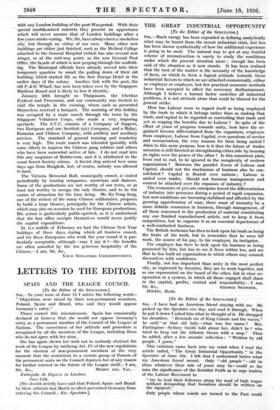THE GREAT INDUSTRIAL OPPORTUNITY'
[To the Editor of the SPECTATOR.] Snt,—Much energy has been expended in defining analytically what may be learnt from the recent industrial crisis, but less has been shown synthetically of how the additional experience is going to be used. The natural way to get at any •fruitful scheme of reconstruction is surely to study the conditions under which the present situation arose ; enough has been said; of the situation as it now stands. It has been realized that the root of the matter is the necessity of the knowledge of facts, on which to form a logical attitude towards those industrial factors to which we are attached economically, .either as employer or employee, but few practical economic methods have been accepted to affect the necessary disillusionment. Although I believe a human factor underlies all industrial problems, it is not attitude alone that could be blamed for the general strike.
How has Labour come to regard itself as being employed by the trade to which it belongs rather than as making that trade, and capital to be regarded as controlling that trade and yet as reaping the benefits due to Labour ? In spite of the effort of years of progress towards unity, how have the or- ganized become differentiated from the organizers, employee from employer, Labour from Capital, over questions of service and remuneration, the very reasons for their being united ? Alien to this same purpose, how is it that the future of trades unionism is still directed at strengthening either side by insuring its rights over the power of the other ? Is this consistent plan, from end to end, to be ignored in the complexity of modern organization ? Between the parallel forces of Labour and Capital, should not the mechanism of business also be con- solidated ? Capital is floated over nations ; • Labour is united over trades. Should not business management and control be attached over the expanses of industry.? , The economics of private enterprise forced the differentiation of industry into processes during a period of rapid expansion, but now conditions are becoming stabilized and afforded by the growing apprehension of man, there must of necessity be a more definite connexion in business, through management, of all those concerned in the production of material constituting any one finished manufactured article, not to keep it from competition, but to organize it as an essential department of
a well-conducted business. .•
The British workman has then to look upon his trade as being the fruits of his work, but to remember_ that he owes hi4 work, the source of his pay, to his employer, its instigator.
The employer has then to look upon his business as being promoted by him, but has to see it from within too, and see that he has built an organization in which others may commit
themselVes with confidence. . Finally, not less important tha unity i _ n in the most perfect .
city, as expressed by Socrates, they are to work together, not as one represented on the board of the other, but in close co- operation in a system, in which all those engaged shall share in the capital, profits.; control and responsibility.—I am,










































 Previous page
Previous page